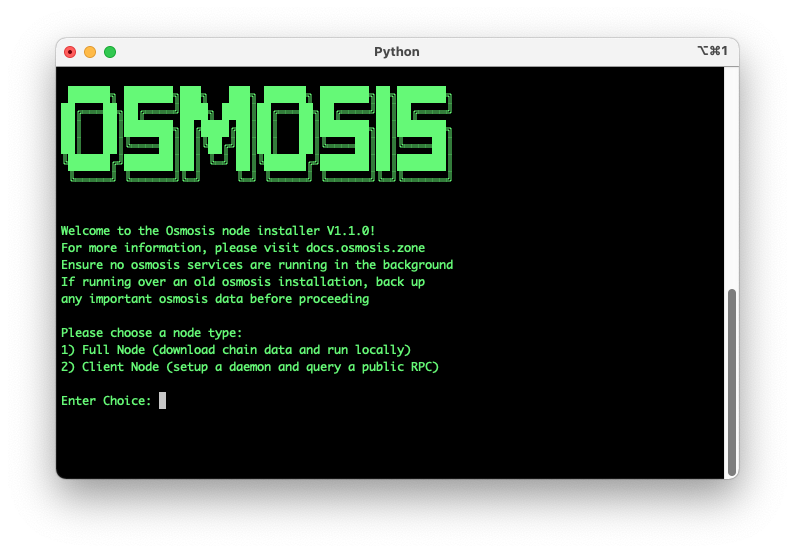# Osmosisd
# Minimum Requirements
The minimum recommended specs for running osmosisd is as follows:
- 8-core (4 physical core), x86_64 architecture processor
- 32 GB RAM (or equivalent swap file set up)
- 1 TB of storage space
You can check if you have enough storage to run osmosisd here (opens new window).
# Commands
Go to commands (opens new window) to learn more.
# Quick Start
Go to https://get.osmosis.zone/ (opens new window) or copy and past the following into your terminal, then follow the onscreen instructions:
curl -sL https://get.osmosis.zone/install > i.py && python3 i.py

If you are running on an Apple M1 Chip and are running into issues with osmosisd not being a recognized command:
git clone https://github.com/osmosis-labs/osmosis.git
make build
sudo cp build/osmosisd /usr/local/bin
2
3
# Manual Installation
# Update System
This guide will explain how to install the osmosisd binary onto your system.
On Ubuntu, start by updating your system:
sudo apt update
sudo apt upgrade --yes
# Install Build Requirements
Install make and gcc.
sudo apt install git build-essential ufw curl jq snapd --yes
Install go:
wget -q -O - https://git.io/vQhTU | bash -s -- --version 1.18.1
After installed, open new terminal to properly load go
# Install Osmosis Binary
Clone the osmosis repo, checkout and install v11.0.0:
cd $HOME
git clone https://github.com/osmosis-labs/osmosis
cd osmosis
git checkout v11.0.0
make install
2
3
4
5
Note
If you came from the testnet node instruction, click here to return
If you came from the mainnet node instruction, click here to return
# Commands
This section describes the commands available from osmosisd, the command line interface that connects a running osmosisd process.
# add-genesis-account
Adds a genesis account to genesis.json.
Syntax
osmosisd add-genesis-account <address-or-key-name> '<amount><coin-denominator>,<amount><coin-denominator>'
Example
osmosisd add-genesis-account acc1 '200000000uOsmo,550000ukrw'
# collect-gentxs
Collects genesis transactions and outputs them to genesis.json.
Syntax
osmosisd collect-gentxs
# debug
Helps debug the application. For a list of syntax and subcommands, see the debug subcommands.
# export
Exports the state to JSON.
Syntax
osmosisd export
# gentx
Adds a genesis transaction to genesis.json.
Syntax
osmosisd gentx <key-name> <amount><coin-denominator>
Example
osmosisd gentx myKey 1000000uOsmo --home=/path/to/home/dir --keyring-backend=os --chain-id=test-chain-1 \
--moniker="myValidator" \
--commission-max-change-rate=0.01 \
--commission-max-rate=1.0 \
--commission-rate=0.07 \
--details="..." \
--security-contact="..." \
--website="..."
2
3
4
5
6
7
8
# help
Shows help information.
Syntax
osmosisd help
# init
Initializes the configuration files for a validator and a node.
Syntax
osmosisd init <moniker>
Example
osmosisd init myNode
# keys
Manages Keyring commands. For a list of syntax and subcommands, see the keys subcommands.
# migrate
Migrates the source genesis into the target version and prints to STDOUT.
Syntax
osmosisd migrate <path-to-genesis-file>
Example
osmosisd migrate /genesis.json --chain-id=testnet --genesis-time=2020-04-19T17:00:00Z --initial-height=4000
# query
Manages queries. For a list of syntax and subcommands, see the query subcommands.
# rosetta
Creates a Rosetta server.
Syntax
osmosisd rosetta
# start
Runs the full node application with Tendermint in or out of process. By default, the application runs with Tendermint in process.
Syntax
osmosisd start
# status
Displays the status of a remote node.
Syntax
osmosisd status
# tendermint
Manages the Tendermint protocol. For a list of subcommands, see
# testnet
Creates a testnet with the specified number of directories and populates each directory with the necessary files.
Syntax
osmosisd testnet
Example
osmosisd testnet --v 6 --output-dir ./output --starting-ip-address 192.168.10.2
# tx
Retrieves a transaction by its hash, account sequence, or signature. For a list of full syntax and subcommands, see the tx subcommands.
Syntax to query by hash
osmosisd query tx <hash>
Syntax to query by account sequence
osmosisd query tx --type=acc_seq <address>:<sequence>
Syntax to query by signature
osmosisd query tx --type=signature <sig1_base64,sig2_base64...>
# txs
Retrieves transactions that match the specified events where results are paginated.
Syntax
osmosisd query txs --events '<event>' --page <page-number> --limit <number-of-results>
Example
osmosisd query txs --events 'message.sender=cosmos1...&message.action=withdraw_delegator_reward' --page 1 --limit 30
# unsafe-reset-all
Resets the blockchain database, removes address book files, and resets data/priv_validator_state.json to the genesis state.
Syntax
osmosisd unsafe-reset-all
# validate-genesis
Validates the genesis file at the default location or at the location specified.
Syntax
osmosisd validate-genesis </path-to-file>
Example
osmosisd validate-genesis </genesis.json>
# version
Returns the version of Osmosis you're running.
Syntax
osmosisd version




